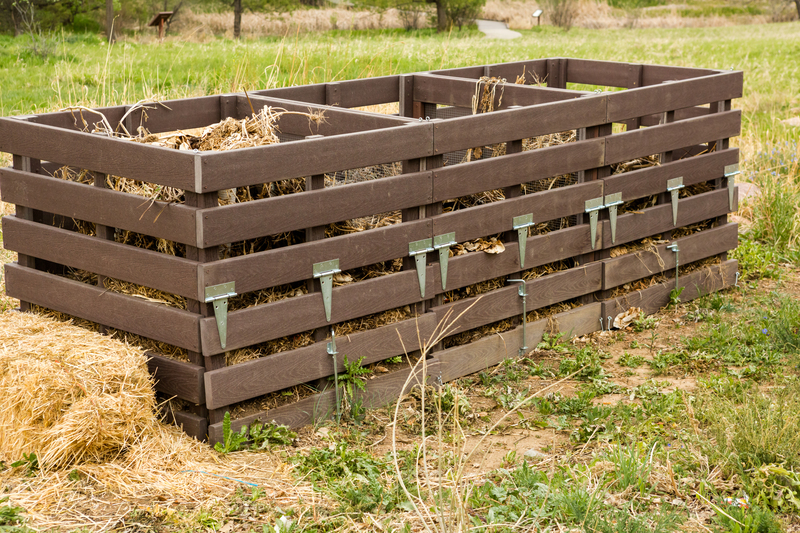The Future of Convenient Plant Pot Disposal: Paving the Way for Sustainable Gardening
Gardening is a beloved hobby enjoyed by millions around the world. While the joy of watching plants grow brings satisfaction, maintaining a sustainable gardening routine can be challenging. One of the persistent concerns for environmentally conscious gardeners lies in the management and **disposal of plant pots**. Traditional plant pots, often made from plastic, present significant environmental challenges once they're no longer of use. With increasing environmental awareness, the future of convenient plant pot disposal has become a critical focal point for gardeners, manufacturers, and policymakers alike.

Why Is Plant Pot Disposal Important?
The humble plant pot may seem insignificant, but improper disposal can contribute to sizable waste problems. Plastic plant containers are especially problematic, as they are:
- Non-biodegradable: Most traditional plant pots are made of hard plastics that can take hundreds of years to decompose.
- Abundant: Millions are used yearly, especially in commercial gardening, landscaping, and nurseries.
- Difficult to recycle: Many recycling facilities can't process plant pot plastics due to additives or residues.
Understanding the lasting impact of these issues has prompted the gardening community to look for innovative and sustainable plant pot disposal methods.
Environmental Impact of Traditional Pot Disposal
When plant pots are disposed of thoughtlessly, they often end up in landfills or incinerators. Landfilled pots occupy valuable space and release harmful chemicals in the process of slow decomposition. Incineration, on the other hand, contributes to air pollution. The immense volume of plastic pots, both from personal gardening and industrial operations, amplifies these environmental consequences.
Current Challenges in Plant Pot Disposal
To appreciate the future potential of convenient plant pot disposal, it's crucial to understand the barriers we currently face:
- Lack of standard recycling programs - Most municipal curbside recycling does not accept plant pots due to their material composition and residues.
- Low recyclability rates - Additives and dyes in plastics lower the recyclability potential of many pots.
- Logistical hurdles - Collecting and transporting used pots to specialized facilities can be impractical for individual gardeners.
Given these hurdles, the conversation has shifted to finding innovative, efficient, and eco-friendly solutions for managing and disposing of unwanted plant pots.
Innovative Solutions Guiding the Future of Plant Pot Disposal
Thankfully, a new era of sustainable gardening is dawning. With growing demand for environmental responsibility, the future of convenient plant pot disposal promises to be both brighter and greener. Let's explore emerging trends and technologies transforming the landscape:
1. Biodegradable Plant Pots
Perhaps the most exciting development is the rise of biodegradable and compostable plant pots. These pots are crafted from natural materials such as coconut coir, peat, wood fiber, rice husks, or even compressed cow dung. Their advantages include:
- Natural breakdown: Once planted into the soil or compost bin, these pots decompose within months, enriching the earth instead of polluting it.
- No waste lingering: Gardeners can place the pot directly in the soil, which eliminates the need for transportation or special disposal protocols.
- Healthier plant root systems: Roots can push through many types of biodegradable pots, minimizing transplant shock and promoting vigorous growth.
As demand increases, more manufacturers are investing in these sustainable alternatives. Their broad adoption could revolutionize the disposal of plant pots and dramatically reduce plastic waste.
2. Return and Reuse Schemes
Garden centers and nurseries are starting to embrace return and reuse schemes as a way of minimizing single-use plastics. Here's how these programs work:
- Customers return: Shoppers bring back used pots to the store rather than throwing them away.
- Cleaning and sterilization: Returned pots are washed and treated before being used again for new plants.
- Encouraging circularity: These schemes promote a circular economy, reducing reliance on virgin plastic production.
For these systems to thrive, public participation and retailer commitment are essential. Some nurseries even offer discounts or rewards for returned pots, further incentivizing sustainable behavior.
3. Advanced Recycling Technologies
Traditional recycling programs usually reject plant pots because of their unique plastics and contamination (soil, fertilizer, and water residues). However, technological advancements are making it easier to recycle more types of plastics, including those used for garden pots. Some of the latest breakthroughs include:
- Specialized plastic sorting: New AI-powered and chemical methods efficiently separate plant pot plastics from other waste, increasing processing rates.
- Plastics with embedded tracers: These invisible markers help recycling facilities quickly identify compatible materials.
- Closed-loop manufacturing: Some brands use only recycled pots to make new ones, creating a sustainable production cycle.
Municipalities and private companies are collaborating to expand these advanced recycling solutions, offering hope for a more convenient and eco-friendly plant pot disposal future.
4. DIY and Creative Reuse
Not all plant pots need to leave your property once the original plant is gone. Gardeners are increasingly repurposing old plastic pots for a variety of uses around the home and garden, such as:
- Seed starting trays and propagation vessels
- Organizers for garden tools, craft supplies, or hardware
- Drainage layers in larger planting containers
- Planters for container gardening, herbs, or succulents
This approach reduces waste and inspires creativity, offering additional pathways to a greener lifestyle.
How New Technologies Will Shape the Future of Plant Pot Disposal
Innovation continues to drive the evolution of plant pot disposal solutions. Here are some promising technologies on the horizon:
- Smart tracking systems: RFID tags or QR codes on plant pots could help consumers locate nearby return or recycling facilities by scanning the label with their smartphone.
- Enzyme-based bioplastics: Research into enzyme-enriched plastics may soon deliver pots that naturally degrade in compost or soil, leaving no harmful residues.
- Community recycling hubs: Shared drop-off locations in neighborhoods where plant pots can be collected in bulk for recycling or redistribution, lowering environmental footprints.
- Subscription garden kits: Companies delivering plants in reusable or returnable packaging as part of a closed-loop subscription system.
Policy and Community Initiatives Accelerating Change
Forward-thinking policies and grassroots initiatives are essential for ensuring a widespread shift to eco-conscious plant pot disposal. Some of the most impactful measures include:
- Legislation mandating eco-friendly materials: Some jurisdictions are banning single-use plastics, including those used in garden pots, and setting standards for biodegradable alternatives.
- Extended Producer Responsibility (EPR): Policymakers can require manufacturers to take responsibility for the end-of-life disposal of plant pots, encouraging better product design and recovery systems.
- Educational campaigns: Local governments and gardening organizations are launching programs to raise awareness and teach best practices for sustainable disposal.

How Gardeners Can Contribute to Convenient and Sustainable Plant Pot Disposal
While systemic changes are vital, individual gardeners play a pivotal role in shaping the future of convenient plant pot disposal. Here are practical steps every gardener can take:
- Choose biodegradable pots whenever possible for new plant purchases.
- Participate in local return/reuse programs offered by retail nurseries or garden centers.
- Clean and store pots for DIY reuse in your own gardening projects.
- Encourage local action by proposing community recycling hubs or organizing pot swap events.
- Educate others about the environmental impact of traditional pot disposal and the benefits of sustainable alternatives.
By adopting these habits, you'll not only reduce your personal plastic footprint but also encourage a broader cultural shift towards sustainability.
Brands Leading the Way in Eco-Friendly Plant Pot Disposal
Eco-conscious brands are listening to consumer demand by pioneering:
- Plantable pots that can be directly transplanted into the ground
- Pots made from recycled ocean plastics or agricultural byproducts
- Take-back programs that accept used pots for professional recycling
These innovations are setting the industry standard for what will soon be expected by eco-savvy gardeners everywhere.
Conclusion: Cultivating a Greener Future with Responsible Plant Pot Disposal
The journey towards a more sustainable gardening experience is gaining momentum, and convenient plant pot disposal sits at the heart of this green revolution. As innovation flourishes across materials science, recycling technology, and community-driven initiatives, the obstacles of the past will give way to a new, responsible norm.
By embracing biodegradable plant pots, supporting reuse schemes, investing in advanced recycling initiatives, and making an effort to repurpose or recycle whenever possible, gardeners can make a real difference. The collective outcome is a future where beautiful gardens and a healthy planet go hand in hand.
As we look forward, the critical question is not just how to dispose of a plant pot, but how to do so in a way that nourishes our ecosystems, builds community, and sets the stage for generations of sustainable gardeners to come. If each of us commits to responsible **plant pot disposal**, together, we can help shape a greener, cleaner, and more beautiful world.